#hohenzollern bracket
Explore tagged Tumblr posts
Text
The Bracket: Round 1

Our Round 1 Matchups Will Be:
Albrecht Friedrich vs Friedrich Wilhelm III
Friedrich Wilhelm I vs Wilhelm I
Wilhelm II vs Friedrich I
Friedrich Wilhelm II vs Joachim Friedrich
As always, propaganda is encouraged!
66 notes
·
View notes
Text
As an update, unlike the @best-habsburg-monarch bracket, we will be including consorts. Why? Many of the men are mid.
0 notes
Note
Dear Habsburgs, Fernando II was not from England. He had lived in Germanic, Austrian, and Slovakian lands.
The Prussians and the Austrians right now

Nothing like a common enemy to bring feuding homoerotic rivals together
#rping as a whole dynasty#best habsburg bracket#we do agree about England#but clearly Victoria was broken up by the loss of her Albert#in our experience a Habsburg or Hohenzollern’s loss would not cause such distress
131 notes
·
View notes
Text
Description & Rules
Have you ever wondered why Russia is the way it is? You can thank these beautiful, beautiful people for at least the significant chunk of it! For better or for worse. And we are here to determine which one of them is... Most significant? Interesting? Best (least bad) person? Well, what does "best" mean here is an excercise best left to the audience. In any case, we are here to celebrate their lives and achievements, because Romanovs were historically a lot of things, but never, ever, EVER boring. Which is why they are the best royal house. No I am not sorry @best-habsburg-monarch and @best-hohenzollern-ruler
Okay, I am a little sorry, because they were the ones who gave me the idea. Love you, guys!
Rules:
One poll every Thursday, with regular bonus polls every Friday.
Since historically there have been 18 rulers from the house of Romanov and all of them are unique little snowflakes, none of whom I'd forgive myself for throwing out, I decided for a bit less traditional approach to this poll. Namely, there is going to be a big initial Elimination Round, during which 9 pairs of contestants will compete against each other. Of the 9 winners, the one who has won with by the most narrow margin is also eliminated. Regular Round will thus have 8 contestants and will be followed by Semifinals and Finals.
The contestants are more or less who you'd expect, with some caveats. Namely, I took the liberty to replace Ivan V. with Anna Leopoldovna and Peter II. with Sofia Alexeievna. Because unlike a certain dynasty, we do not involve children in our drama.
I am using English language transliterations of the Russian names. With patronymics.
Propaganda and antipropaganda are encouraged, within reason. You can refer to current events, but please don't make it into a political soapbox! This is ultimately meant to be a tongue-in-cheek historical game, same as the Habsburg and Hohenzollern polls. Also don't be dicks in general, like no racism, sexism, attrocity denial or any other nastiness. That hopefully goes without saying. Also: propaganda does not necessarily reflect the opinions of the admin! I will post any and all propaganda and antipropaganda that fits the basic standards of this poll. If you have any objections to the opinions expressed, argue with the original poster - unless, again, poster is just factually wrong or has said something horrible that I didn't notice.
UPDATE: The roleplay nonsense was transferred onto @best-romanov-monarch-official If you liked that aspect of this blog (which I doubt, or else I wouldn't have scrubbed this blog clean of it), check that account.
TAGS: #main bracket - polls and recaps of the main bracket #main bracket recap - recaps of the rounds of the main bracket #bonus polls - well, bonus polls #memes - well, memes #about us - what others say about this bracket (with our response or otherwise) #housekeeping - other posts, mainly about how this poll works, updates etc.
(PICTURE SOURCES
Thumbnail: https://www.rbth.com/history/326376-russian-blood-romanov-dynasty
Profile pic: https://heraldicjewelry.com/pages/romanov-family-crest)
14 notes
·
View notes
Text
@best-hohenzollern-ruler, @best-habsburg-monarch, @best-romanov-monarch guess what.
17 notes
·
View notes
Text
I know we said no polls until February; but we've decided to decide something now.
The second set of options is more because I know some people might want to see them there, but I want to know what the gut decision is anyway.
You may be going "Wasn't Prussia part of the HRE? Why do you have to ask if it should be allowed?" Well dear friends, the Prussian relationship with Holy Rome is complicated. Some argue by being Hohenzollern it is by proxy, even though Frederick decided to style himself King of Prussia, and we're sure he knew within the empire that wasn't allowed.
7 notes
·
View notes
Text
@best-hohenzollern-ruler I believe this one is one of yours, Liebling (though he has already lost in your bracket).
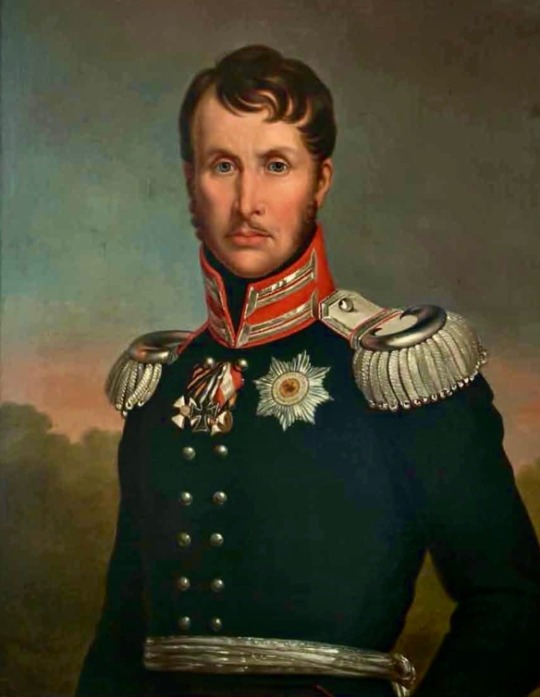

Friedrich Wilhelm III
Propaganda:
"He managed to make someone as pretty as his wife genuinely fall in love with him and led a happy marriage; that must count for something.”
(admin note: for a Hohenzollern, "had a happy marriage" is an outlier)
Pius VII
Propaganda:
“I mean, for a pope, not the worst looking. The potential direct line though could be valuable”
25 notes
·
View notes
Link
“The dictatorship is necessary because it is a case, not of partial changes, but of the very existence of the bourgeoisie. No agreement is possible on this ground. Only force can be the deciding factor. The dictatorship of the proletariat does not exclude, of course, either separate agreements, or considerable concessions, especially in connection with the lower middle class and the peasantry. But the proletariat can only conclude these agreements after having gained possession of the apparatus of power, and having guaranteed to itself the possibility of independently deciding on which points to yield and on which to stand firm, in the interests of the general Socialist task.
Kautsky now repudiates the dictatorship of the proletariat at the very outset, as the “tyranny of the minority over the majority.” That is, he discerns in the revolutionary regime of the proletariat those very features by which the honest Socialists of all countries invariably describe the dictatorship of the exploiters, albeit masked by the forms of democracy.
Abandoning the idea of a revolutionary dictatorship, Kautsky transforms the question of the conquest of power by the proletariat into a question of the conquest of a majority of votes by the Social-Democratic Party in one of the electoral campaigns of the future. Universal suffrage, according to the legal fiction of parliamentarism, expresses the will of the citizens of all classes in the nation, and, consequently, gives a possibility of attracting a majority to the side of Socialism. While the theoretical possibility has not been realized, the Socialist minority must submit to the bourgeois majority. This fetishism of the parliamentary majority represents a brutal repudiation, not only of the dictatorship of the proletariat, but of Marxism and of the revolution altogether. If, in principle, we are to subordinate Socialist policy to the parliamentary mystery of majority and minority, it follows that, in countries where formal democracy prevails, there is no place at all for the revolutionary struggle. If the majority elected on the basis of universal suffrage in Switzerland pass draconian legislation against strikers, or if the executive elected by the will of a formal majority in Northern America shoots workers, have the Swiss and American workers the “right” of protest by organizing a general strike? Obviously, no. The political strike is a form of extra-parliamentary pressure on the “national will,” as it has expressed itself through universal suffrage. True, Kautsky himself, apparently, is ashamed to go as far as the logic of his new position demands. Bound by some sort of remnant of the past, he is obliged to acknowledge the possibility of correcting universal suffrage by action. Parliamentary elections, at all events in principle, never took the place, in the eyes of the Social-Democrats, of the real class struggle, of its conflicts, repulses, attacks, revolts; they were considered merely as a contributory fact in this struggle, playing a greater part at one period, a smaller at another, and no part at all in the period of dictatorship.
In 1891, that is, not long before his death, Engels, as we just heard, obstinately defended the dictatorship of the proletariat as the only possible form of its control of the State. Kautsky himself more than once repeated this definition. Hence, by the way, we can see what an unworthy forgery is Kautsky’s present attempt to throw back the dictatorship of the proletariat at us as a purely Russian invention.
Who aims at the end cannot reject the means. The struggle must be carried on with such intensity as actually to guarantee the supremacy of the proletariat. If the Socialist revolution requires a dictatorship – ”the sole form in which the proletariat can achieve control of the State” – it follows that the dictatorship must be guaranteed at all cost.
To write a pamphlet about dictatorship one needs an ink-pot and a pile of paper, and possibly, in addition, a certain number of ideas in one’s head. But in order to establish and consolidate the dictatorship, one has to prevent the bourgeoisie from undermining the State power of the proletariat. Kautsky apparently thinks that this can be achieved by tearful pamphlets. But his own experience ought to have shown him that it is not sufficient to have lost all influence with the proletariat, to acquire influence with the bourgeoisie.
It is only possible to safeguard the supremacy of the working class by forcing the bourgeoisie accustomed to rule, to realize that it is too dangerous an undertaking for it to revolt against the dictatorship of the proletariat, to undermine it by conspiracies, sabotage, insurrections, or the calling in of foreign troops. The bourgeoisie, hurled from power, must be forced to obey. In what way? The priests used to terrify the people with future penalties. We have no such resources at our disposal. But even the priests’ hell never stood alone, but was always bracketed with the material fire of the Holy Inquisition, and with the scorpions of the democratic State. Is it possible that Kautsky is leaning to the idea that the bourgeoisie can be held down with the help of the categorical imperative, which in his last writings plays the part of the Holy Ghost? We, on our part, can only promise him our material assistance if he decides to equip a Kantian-humanitarian mission to the realms of Denikin and Kolchak. At all events, there he would have the possibility of convincing himself that the counter-revolutionaries are not naturally devoid of character, and that, thanks to their six years’ existence in the fire and smoke of war, their character has managed to become thoroughly hardened. Every White Guard has long ago acquired the simple truth that it is easier to hang a Communist to the branch of a tree than to convert him with a book of Kautsky’s. These gentlemen have no superstitious fear, either of the principles of democracy or of the flames of hell – the more so because the priests of the church and of official learning act in collusion with them, and pour their combined thunders exclusively on the heads of the Bolsheviks. The Russian White Guards resemble the German and all other White Guards in this respect – that they cannot be convinced or shamed, but only terrorized or crushed.
The man who repudiates terrorism in principle – i.e., repudiates measures of suppression and intimidation towards determined and armed counter-revolution, must reject all idea of the political supremacy of the working class and its revolutionary dictatorship. The man who repudiates the dictatorship of the proletariat repudiates the Socialist revolution, and digs the grave of Socialism.
* * *
At the present time, Kautsky has no theory of the social revolution. Every time he tries to generalize his slanders against the revolution and the dictatorship of the proletariat, he produces merely a réchauffé of the prejudices of Jaurèsism and Bernsteinism.
“The revolution of 1789,” writes Kautsky, “itself put an end to the most important causes which gave it its harsh and violent character, and prepared the way for milder forms of the future revolution.” (Page 140) [Translator’s Note – For convenience sake, the references throughout have been altered to fall in the English translation of Kautsky’s book. Mr. Kerridge’s translation, however, has not been adhered to.] Let us admit this, though to do so we have to forget the June days of 1848 and the horrors of the suppression of the Commune. Let us admit that the great revolution of the eighteenth century, which by measures of merciless terror destroyed the rule of absolutism, of feudalism, and of clericalism, really prepared the way for more peaceful and milder solutions of social problems. But, even if we admit this purely liberal standpoint, even here our accuser will prove to be completely in the wrong; for the Russian Revolution, which culminated in the dictatorship of the proletariat, began with just that work which was done in France at the end of the eighteenth century. Our forefathers, in centuries gone by, did not take the trouble to prepare the democractic way – by means of revolutionary terrorism – for milder manners in our revolution. The ethical mandarin, Kautsky, ought to take these circumstances into account, and accuse our forefathers, not us. Kautsky, however, seems to make a little concession in this direction. “True,” he says, “no man of insight could doubt that a military monarchy like the German, the Austrian, or the Russian could be overthrown only by violent methods. But in this connection there was always less thought” (amongst whom?) “of the bloody use of arms, and more of the working class weapon peculiar to the proletariat – the mass strike. And that a considerable portion of the proletariat, after seizing power, would again – as at the end of the eighteenth century – give vent to its rage and revenge in bloodshed could not be expected. This would have meant a complete negation of all progress.” (Page 147) As we see, the war and a series of revolutions were required to enable us to get a proper view of what was going on in reality in the heads of some of our most learned theoreticians. It turns out that Kautsky did not think that a Romanoff or a Hohenzollern could be put away by means of conversations; but at the same time he seriously imagined that a military monarchy could be overthrown by a general strike – i.e., by a peaceful demonstration of folded arms. In spite of the Russian revolution, and the world discussion of this question, Kautsky, it turns out, retains the anarcho-reformist view of the general strike. We might point out to him that, in the pages of its own journal, the Neue Zeit, it was explained twelve years ago that the general strike is only a mobilization of the proletariat and its setting up against its enemy, the State; but that the strike in itself cannot produce the solution of the problem, because it exhausts the forces of the proletariat sooner than those of its enemies, and this, sooner or later, forces the workers to return to the factories. The general strike acquires a decisive importance only as a preliminary to a conflict between the proletariat and the armed forces of the opposition – i.e., to the open revolutionary rising of the workers. Only by breaking the will of the armies thrown against it can the revolutionary class solve the problem of power – the root problem of every revolution. The general strike produces the mobilization of both sides, and gives the first serious estimate of the powers of resistance of the counterrevolution. But only in the further stages of the struggle, after the transition to the path of armed insurrection, can that bloody price be fixed which the revolutionary class has to pay for power. But that it will have to pay with blood, that, in the struggle for the conquest of power and for its consolidation, the proletariat will have not only to be killed, but also to kill – of this no serious revolutionary ever had any doubt. To announce that the existence of a determined life-and-death struggle between the proletariat and the bourgeoisie “is a complete negation of all progress,” means simply that the heads of some of our most reverend theoreticians take the form of a camera-obscura, in which objects are represented upside down.
But, even when applied to more advanced and cultured countries with established democratic traditions, there is absolutely no proof of the justice of Kautsky’s historical argument. As a matter of fact, the argument itself is not new. Once upon a time the Revisionists gave it a character more based on principle. They strove to prove that the growth of proletarian organizations under democratic conditions guaranteed the gradual and imperceptible – reformist and evolutionary – transition to Socialist society – without general strikes and risings, without the dictatorship of the proletariat.”
0 notes
Text
Round 2: Friedrich Wilhelm III vs Wilhelm I
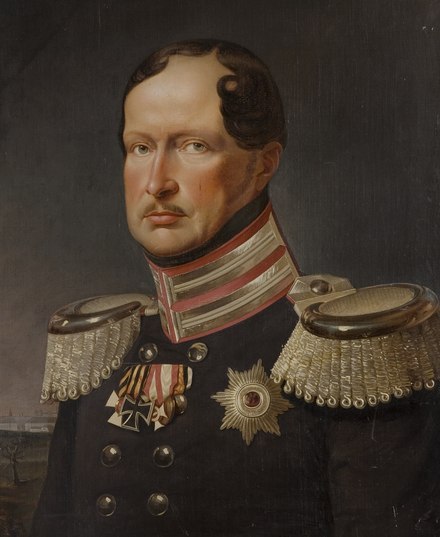

Friedrich Wilhelm III (r. 1797-1840)
A weak willed and indecisive man, it was only after immense pressure from his wife that Friedrich Wilhelm took up the banner against Napoleon. It was under his reign that the disastrous defeats at Jena and Auerstadt took place and that Prussia was carved up into the Confederation of the Rhine.
His promise of a constitution galvanized the Prussian people to take up arms, though he ultimately failed to follow through once the war had ended.
Despite his ineptitude as a leader and general, he was quite a good father. His marriage to Louise von Mecklenburg-Strelitz was a peaceful and happy one and his relationship with his kids was quite impressive for a Hohenzollern. (Note: Low bar - T)
Wilhelm I (r. 1861-1888)
Wilhelm der Große
As the second son of Friedrich Wilhelm III, it was never expected that Wilhelm would take up the crown. As was his duty as a German prince, Wilhelm joined the military. There he served under General Blücher in the campaign against Napoleon and won the Iron Cross for his valiant actions on the battlefield.
Nowadays he is fittingly known as "Wilhelm the Great" for his role in the unification of Germany. It was under his guidance that Otto von Bismarck was appointed Minister-President of Prussia during the 1862 crisis and it was with his permission that the Iron Chancellor reshaped the map of Europe to facilitate Germany's ascension.
26 notes
·
View notes
Text
Bonus Round: Best General
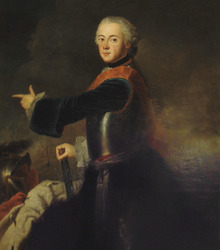

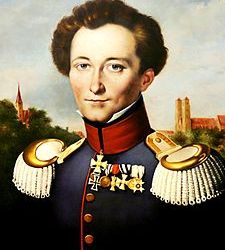
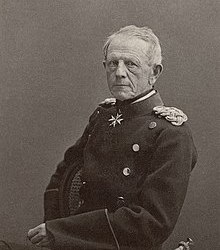
Prince Heinrich of Prussia (1726–1802)
Prinz Heinrich prominently served as a general during the Seven Year's War. What contemporaries and historians alike have found so impressive about his leadership was that he made so few, if any, blunders in carrying out the war. This was a sentiment echoed by his brother, Frederick the Great, who absorbs much of the credit by osmosis. His victories and maneuvers allowed his brother to carry on a war that the prince would have preferred to be ended sooner than 1756. Outside of war, he is his own colorful character, in line with that generation of Hohenzollern men and women.
Gebhard Leberecht von Blücher (1742-1819)
What hot blooded Prussian does not know the name Blücher? It is he we have to thank for the defeat of the villain Napoleon - not once, but twice! The first great defeat at Leipzig restored Prussia to her place of due prominence among the nations of Europe. At Waterloo, he and his troops arrived as Wellington's guardian angels to defeat the Corsican devil. The main army battered, the reserves shunted away, Blücher became an immortal hero to all who opposed shrimpy French tyranny.
Carl von Clausewitz (1780-1831)
Clausewitz's greatest achievement is his book Vom Krieg (On War), a tome that rewrote the rules of conflict for a post Napoleonic age. Among many of the revolutionary ideas contained with in it, a few to highlight are the "fog of war", the concept of friction and the idea of a military genius.
Helmuth von Moltke the Elder (1800-1891)
As Chief of the Prussian General Staff, Moltke worked hand in hand with War Minister von Roon to deliver three swift victories for the Prussian state. It was his genius on display during Königgratz, during Sedan and Metz and Gravelotte. Without him, Prussia's ascendancy and Germany's unification would not have been possible.
Moltke understood that with the growing size of modern armies, generalship such as that underneath Napoleon or Blücher was unfeasible. Instead of a general leading his army as a whole, Motlke devised a corp system wherein smaller clusters of troops would move independently of each other — Theodor, get your hands off of me!
#hohenzollern bracket#bonus round#prince henry of prussia#prinz heinrich von preussen#gebhard von blücher#carl von clausewitz#moltke the elder#staffer theodor#staffer leopold
27 notes
·
View notes
Text
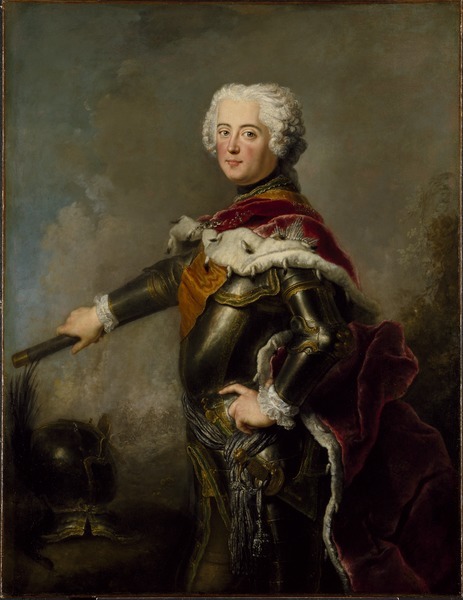

Friedrich der Große (r. 1740 - 1786)
'Old Fritz'
Friedrich's relationship with his father, Friedrich Wilhelm I, is an oft-discussed topic. It was marked by public and private abuses and emotional and physical in nature. While the King's beheading of the then-crown prince's friend was the culmination of this treatment, it was consistent over Fritz's adolescence. Denigrated for his effeminacy, physically assaulted, and denied all earthy respite; it is little wonder that Fritz attempted to flee his father's persecution the first chance he had.
In 1740, Friedrich led Prussia against its first bout against Austrian tyranny. Did we have any claim to Silesia? Not a one. Did we agree to the Pragmatic Sanction? Technically, yes. Did that matter to Old Fritz? It did not, and for that he brought Prussia out of the scrapheap and into history! Because of him Prussia will live on for centuries! ...What the hell is a Kaliningrad?
Many rumors abounded about Friedrich's paramours and proclivities. It's the burden of every great man to endure these sorts of challenges, you see. Some say his testicles were malformed or, even, nonexistent. Some say everything was in fine working order and he sired bastard children with a Madame von Wreech. Some - and this is most absurd, you will agree - even posit that he was a homosexual. I understand hating your wife all too well, but that does not mean 'fortune is a woman and I am not that way inclined' suggests anything improper! ...Voltaire wrote what (Note: I am concerned for your health -L)
Friedrich III (r. March 1888 - June 1888)
The 99-Day King
Surprisingly for a Hohenzollern, Friedrich took a relatively liberal stance to politics. Even more shocking was his pacifist streak that led him to oppose our wars against Denmark, Austria, and France. Do not let his heart fool you; even a Prussian pacifist is nothing to sneer at. In all three conflicts, he commanded his troops capably and treated his opponents with the utmost dignity.
There were many hopes pinned to Friedrich's reign, put there both by himself and his supporters. Alas, he ascended to the throne when he was already terminally il with laryngeal cancer. Push and push as liked, what reforms could a dying emperor make? The most significant aspect of his reign is what it may have been - and what it could have avoided.
We have received a letter, whose author only identified herself as an 'American woman.' It reads: 'I know Fritz is going to beat Fritz, but please look at him. Isn't he the most dreamy Hohenzollern you've ever seen? Those piercing eyes, that strong nose, that beard you could lose your hand in. So what if he didn't like his son? That a crime now in this family? Fritz, your wife is gone, but I know one English maiden who's still seeking a good man. HEY-O!' (Note: Burn this debauchery -L)
27 notes
·
View notes
Text
Frequently Asked Questions
Who is included in this bracket?
Hohenzollerns who ruled over Prussia - whether that be kingdom or duchy. Two regents are included in order to make the numbers for the bracket work.
If there was hypothetically a person who was not a Hohenzollern but was extremely important to the history of Prussia, would he be part of the bracket?
No, Otto von Bismarck is not going to be included. Keep an eye out for him in side brackets though!
What names are going to be used?
Deutsch.
Why is almost everyone named Friedrich, Wilhelm, or Friedrich Wilhelm?
...There are other names?
Can we send in propaganda for or against participants?
Yes! Please refer all propaganda to the staff of the Kreuzzeitung.
The staff of the Cruise-sight-tongue? Who's running this tournament?
The tournament is being conducted by the Kreuzzeitung in an effort to understand our readership. Even historical papers have to modernize. The editorial team is led by Herren Leopold von Pappenheim (@iron--and--blood) and Theodor Lasker (@oldfritz).
Is this blog at all related to the Habsburg monarch tournament?
Excuse me, we do not tolerate such heinous insults here!
17 notes
·
View notes
Text
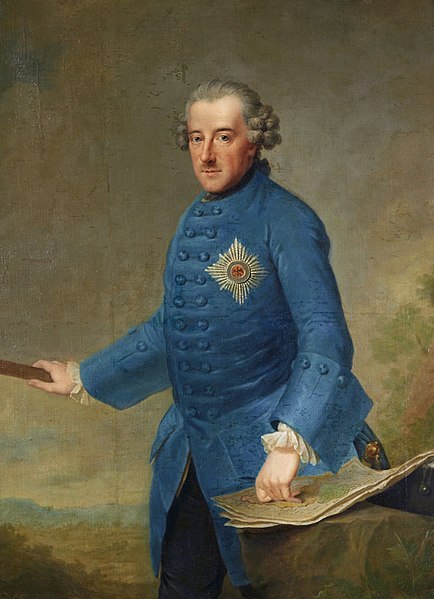

Friedrich der Große (r. 1740 - 1786)
'Old Fritz'
Friedrich and Catherine grasped that universal truth: Poland is a mess. They saw a kingdom fracturing apart at the seams - never you mind who helped to unstitch it - and their hearts wept for the plight of the Poles. In such a state of disarray, what were good neighbors to do but forcefully open the door and invite themselves in? Polnische Wirtschaft was replaced with Preußentum and our people have gotten along swimmingly since.
But that is enough of war, isn't it? No, such a man as Old Fritz was defined by many talents and interests. He prided himself on being more a philosopher than warrior and his creative pursuits attest to this capacity. Before ascending to the throne, he "anonymously" published a treatise titled The Anti-Machiavel. In it, he took a bold stance against prince's limitless pursuit of ambition and power were detrimental to the state and that the best way to rule was with a just mind and heart. While some argue vociferously about what this reveals about the king in light of his wars with Austria, I believe a man should be allowed to say whatever he so chooses and not be held to it. And that is the height of philosophy. (Note: Was your mother a Frenchwoman? -L)
Friedrich, like a dragon, could have hoarded all the brilliance of the lands for himself. But that was not his style, not the color of his soul. Prussia was not to be Sparta alone, but Athens as well. The Academies of Art and Science were revitalized, having fallen into a state of negligence during his father's reign. The Berlin Academy under his reign attracted enlightenment heavyweights such as Maupertius, Francesco Algarotti, Le Mettrie, and others we simply can't afford the space to print. It was under his reign that Berlin began to attract the intellectual prestige it has increasingly been known for.
Albrecht (r. 1525 - 1568)
Duke of Prussia
Albrecht was the first ruler within European with the courage to throw off the yoke of Catholic tyranny. He embraced Lutheranism with open arms, a choice that would echo down from the Hohenzollerns to people of Prussia. Indeed, the wealth he stole reappropriated from papal purses enriched the livelihoods of his nobles. How does this benefit the peasant class? Well, as Herr Reagan was explaining to me one night in Hell, [the rest is scribbled out, followed by 'NO -L' and underlined three times]
Albrecht took a keen interest in the development of schools throughout ducal Prussia. His crowning achievement in this regard was the establishment of Königsberg University, which was intended to rival the Catholic Krakow Academy.
#friedrich der große#frederick the great#hohenzollern bracket#albrecht duke of prussia#round two#staffer theodor
15 notes
·
View notes
Text


Friedrich Wilhelm I (r. 1713-1740)
The Soldier King
His reputation has been tarnished by his relationship with his son, which often devolved into physical and emotional abuse. A noted incident would be the execution of the young Prince's friend, whose only crime was helping the Prince escape his tyrannical father.
Greatly expanded Prussia's military and made it the military might that it is known for today. He adored his legion of Potsdam Giants, who inspired great fear and awe in all who saw them.
Enjoyed torturing his councillors through actions like locking them in a room with baby bears and setting off fireworks nearby or force feeding them laxatives while they were locked in a cell.
Wilhelm I (r. 1861-1888)
First Emperor of Germany
Lived an impressive 90 years. He served under Blücher at the great battle of Waterloo and witnessed the capitulation of Napoleon III at Sedan.
He was responsible for Otto von Bismarck's rise to power and greatly enabled him to unify Germany. Readers, I will allow you to take that any way you will.
Retreated to his country estate after our empire was declared, which I believe many of us can relate to. Most of us would probably prefer to offload our responsibilities onto a half-mad Junker with no moral scruples. (Note: Remove defamation of the former Chancellor before print -L)
15 notes
·
View notes
Text
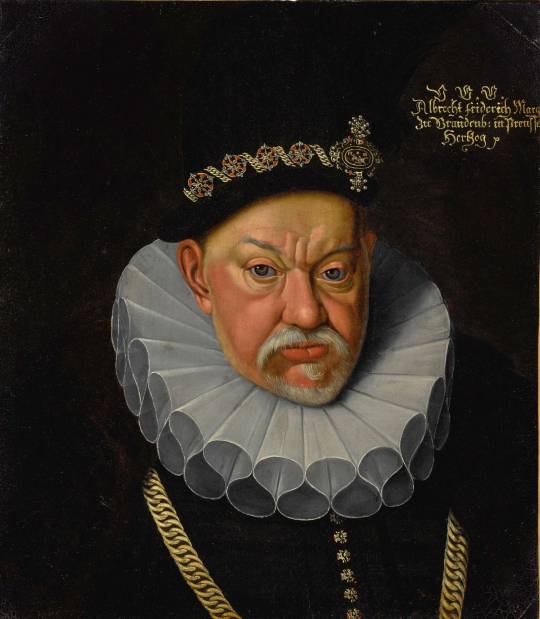

Albrecht Friedrich (r. 1568-1618)
Duke of Prussia
Thanks to his pedigree and fluency in Polish, he was a serious contender for the Polish throne for a time.
Married Marie Elenore of Cleves, whose marriage alliances secured Brandenburg's claim to Jülich...on paper.
Four years into his reign, he began to display signs of an unspecified mental disorder. That didn't inhibit his ability to produce many, many heirs.
Friedrich Wilhelm III (r. 1797-1840)
An inconsistent ruler. His instinctual need to find balance impeded him from choosing a decisive action. I believe in modern parlance this is called a 'centrist.' (Note: Political humor may be divisive to readers -T)
Suffered a string of humiliating defeats against Napoleon that reached their pinnacle with Jena and forced alliance with France. This was the event that forced him to finally listen to his wife, Louise, as well as the pro-reform ministers Gneisenau and Sharnhorst (among others).
In spite of his many flaws as a statesman, he was a better family man than the Hohenzollerns typically produce. By all accounts his marriage with Louise was one of mutual love and respect. One of my sources revealed to me that he was shocked to learn his children referred to him as 'the king' instead of 'papa.'
#albrecht friedrich#friedrich wilhelm iii#frederick william iii#hohenzollern bracket#staffer theodor#round one
11 notes
·
View notes
Text
Round 2: Georg Friedrich vs Friedrich Wilhelm IV


Georg Friedrich (r. 1543-1603)
Margrave of Brandenburg-Ansbach, Regent of Prussia
Georg Friedrich's regency in place of Albrecht Friedrich was by all definitions a successful one. Adept at administration, he reformed the bureaucracy and currency of many of the regions he ruled. His reign was generally peaceful and stable, in contrast to Austria many of his neighbors at the time.
As today is the birthday of our greatest monarch, Friedrich der Große, we must mention that conflicts over the providence of Jägerndorf laid the groundwork for the First Silesian War and the rise of our beloved king. We must wholeheartedly commend him for standing up to the Austrian scourge and allowing one of our most important territories to remain Prussian.
Friedrich Wilhelm IV (r. 1840-1861)
The Erfurt Union was the Prussian response to the Deutsche Bund, unifying many of the north German states. The alliance between Prussia, Saxony, and Hanover was key. While it was ultimately unsuccessful, it laid the groundwork for the later North German Confederation under his sucessor.
Despite his previous hesitations, Friedrich Wilhelm IV did concede to the liberal revolutions and allow for Prussia's first ever constitution. Despite the creation of the Landtag and the allowance for universal male sufferage, the power afforded to the monarch preserved Prussia's conservative governmental traditions.
We here at the Kreuzzeitung must pay a special tribute to Friedrich Wilhelm IV. After the Revolutions of 1848, he assembled a group of conservative noblemen to help combat any further revolutionary fervor. It was that group that founded this esteemed paper, so for that, we thank him.
3 notes
·
View notes